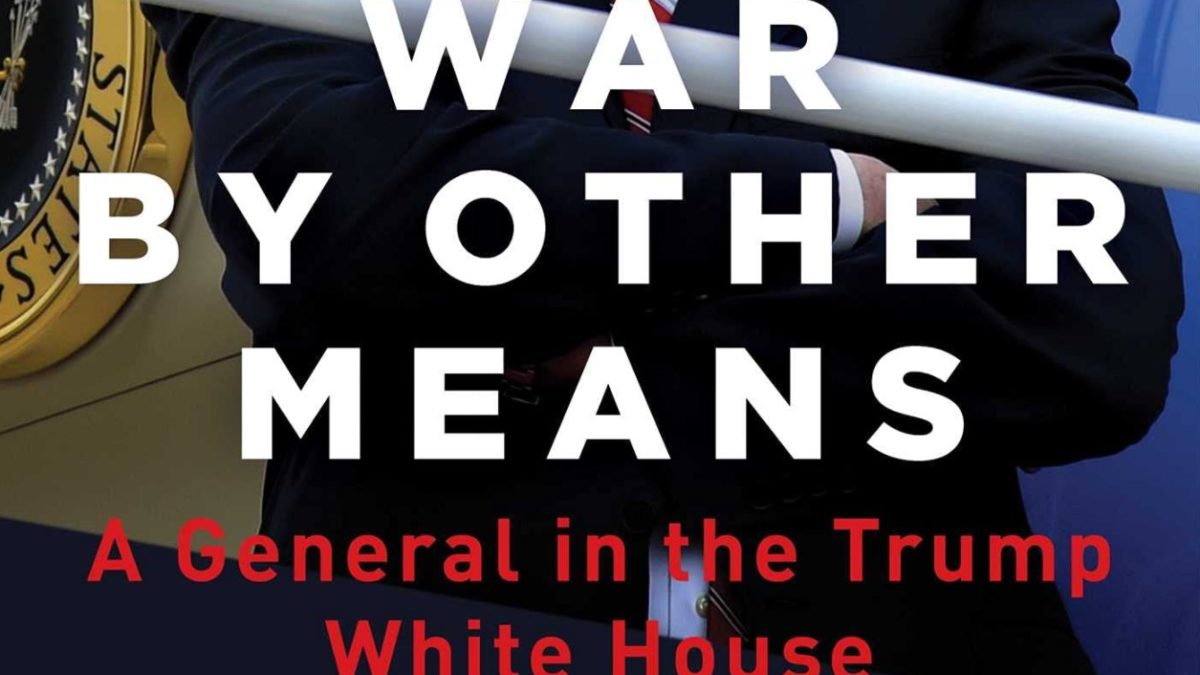With many pundits and political analysts speculating about Donald Trump’s possible run for the presidency in 2024, there is perhaps no better time to review his first term and determine how successful it really was. Who was the man and what was his legacy?
Of course, in order to be fair and accurate in assessing the last president, Americans must have a reliable source who offers a clear, faithful account of what exactly happened. This has been difficult to come by, as almost every official with the slightest connection to Trump has delivered biased accounts to enrich themselves, win approval from the corporate media and Democratic party, or use Trump’s presidency as a launching point for their political philosophy.
An exception to this is Gen. Keith Kellogg in his memoir War by Other Means: A General in the Trump White House. A true soldier and patriot, he aims to set the record straight, highlight the former president’s records and accomplishments, and point out the many obstacles they encountered.
Although Kellogg is heavily partial to Trump, his account is authentic and clear. He doesn’t attempt to analyze Trump or Trumpism, nor does he map out the inner workings of the military and foreign policy establishment. He just describes his own experience and impressions, somehow making potentially complicated issues – e.g., the Robert Mueller investigation, the attack on Qasem Soleimani, the first impeachment, etc. – understandable and human.
Kellogg starts with his own background, which is impressive. In reading about his experiences, which open with the Vietnam War, one can trace the evolution of the American military from the heights of the Cold War to the War on Terror. He describes the rigors of training for the Army Rangers, his early missions in Vietnam, and his time in Panama and Kuwait.
While Kellogg’s military experience could merit a lengthy tome in itself, it somehow takes up less than a third of the book. A man of action with little time for much introspection, Kellogg will note some amusing anecdotes and various moments of badassery as he races through his life.
His reflections on some of these critical moments in history are remarkably short. For instance, after discussing his part in fighting the Viet Cong and even participating in the Tet Offensive, Kellogg concludes, “I will only say that those of us who stayed in the army after Vietnam had an overriding desire that in all future conflicts to have well-articulated, achievable aims for victory.” This is interesting and indicates there will be further commentary, but less than a page later, the chapter is done and Kellogg moves on.
The pace does slow down as Kellogg covers Trump’s presidential campaign. It’s difficult to tell what exactly inspired Kellogg to join Trump’s team—“He spoke his mind—and I liked what he said.” Whatever the case, he felt compelled to join his campaign in some capacity: “Perhaps I had something to offer him as a national security advisor.”
Soon after explaining his connection with Trump, Kellogg retreats from his own story—even quoting not one, but two of Trump’s speeches at length. In one way, this makes sense, seeing that readers simply want to know what Trump was like. In another way, Kellogg’s judgments about others in the Trump administration are never really clear, nor does he say much about his own role.
Most likely, Kellogg just wants to focus on what he knows, which is foreign policy. These chapters are probably the best part of the book, since they illuminate some of Trump’s major accomplishments. Kellogg explains how Trump’s decisiveness and adaptability were key in eliminating ISIS, neutralizing Iran and Syria, brokering peace deals between Israel and formerly hostile countries in the region, and orienting America’s foreign policy towards a more realist, less interventionist vision.
Interestingly, these achievements resulted in part from a little-known mission in Yemen pushed by Gen. Jim Mattis, in which he and other insiders capitalized on Trump’s fresh arrival to DC. Two nights after Trump’s approval, this “low risk” mission resulted in the death of a Navy SEAL, the wounding of several others, and some civilian deaths, “including an eight-year-old Yemeni child.” Beyond the convictions he held prior to his presidency, it was this disaster that set Trump and Kellogg against the “conventional wisdom” aggressively proffered by the Washington elite.
Although mostly deferential and polite with the other cabinet advisors advising Trump, Kellogg does divulge some of his misgivings with their lack of loyalty and overconfidence. Besides mentioning Mattis’s blunder, he discusses in some depth the National Security Advisor Gen. H.R. McMaster, who “thought it was his job to school the president, guide him, and convince him to pursue more conventional and traditional courses of action.”
As with most of Trump’s advisors, McMaster doesn’t stay long. Frankly, it’s hard to fault Trump for making most of these moves.
In his second to last chapter, Kellogg retells the story of Covid-19, paradoxically Trump’s greatest triumph and greatest failure. At the peak of his popularity, fresh off of killing Soleimani and overseeing a booming economy, Trump was confronted by an unknown virus from China. Responding to Trump’s many critics, Kellogg is emphatic in his praise of a president who handled the challenge better than anyone could have reason to expect, acting quickly, pushing the creation of the vaccine, and banning travel from China.
Unfortunately, Anthony Fauci and so many of Trump’s opponents obscured these merits and Kellogg says as much, although anyone following this news won’t find much in Kellogg’s account. Yes, Fauci spoke out of both sides of his mouth and kept declaring doom and gloom. Yes, the media frequently mischaracterized Trump and his efforts. And yes, the Democrats politicized Covid-19 for their own gain.
The book’s final chapter about the election works the same way, with Kellogg giving more a general impression of conservative media than any relevant personal experience. Yes, the election had many irregularities, anomalies, and seemed likely rigged. And yes, the treatment of January 6, 2021 protests and the second impeachment of Trump was all nonsense. Kellogg adds to this without giving any original insight.
Through it all, what is evident in Kellogg’s account is that he is utterly committed to Trump. He stands by the America First philosophy and does not criticize its spokesman at any point.
In one way, this is frustrating since Trump’s time in office was far from perfect, and much could be gained from analyzing the mistakes and learning from them. Indeed, if Trump ran again, many voters will wonder whether he really has learned from his mistakes, particularly with his selection of personnel, his lack of followthrough for punishing corrupt bureaucrats, and his off-color tweets that offended the nation’s soccer moms.
In another way, Kellogg’s lack of criticism and unquestioning loyalty is welcome. As Julie Kelly’s book “Disloyal Opposition” documents, too much questioning and debate can lead to division, lack of purpose, and inaction. Kellogg seems to understand this, so he supports Trump faithfully to the end. He is not an obsequious yes-man, but a humble and trustworthy subordinate—a good soldier.
Moreover, Kellogg’s loyalty allows him to see Trump’s unappreciated virtues. It’s clear by the end of his book that the 45th president was a quick study with incredible energy who was surprisingly practical and responsive. Despite the many roadblocks placed in his way, he really did make Americans safer, richer, and healthier. If given another term, a better cabinet, and fewer milquetoast Republicans, it’s reasonable to expect great things.
Even if Trump decides not to run, Kellogg shows how he has set a new standard for leadership. No matter what succeeding presidents and administrations think of Trump and Trumpism, they are now expected to show the transparency, responsiveness, and energy—rest assured, incontinent dinosaurs like Joe Biden will go extinct soon.
As Kellogg’s book makes clear, even if Trump didn’t win many friends, he did win a few wars, which is what our politics has become.









